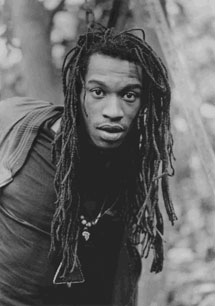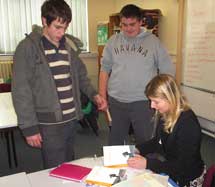|
|

To encourage younger,
reluctant and emergent readers to feel part of the Small
Island Read 2007 project, we will be supplying libraries and other partners
in the participating sites with copies of Benjamin Zephaniah’s
Refugee Boy.
Refugee Boy tells the story of Alem, a young boy with an Ethiopian
father and an Eritrean mother, who is left alone in London and
needs all his courage as he faces up to the British justice system.
It is a powerful, thought-provoking and topical novel that demands
to be read.
You can read some reviews of the book in the Kidz section of the
A Poet
Called Benjamin Zephaniah website. There are lots of interesting articles by and about Benjamin
Zephaniah on the site along with some of his poems.
You can download the Refugee Boy activity pack at the bottom of
this page.
Benjamin Obadiah Iqbal Zephaniah was born in the Handsworth district
of Birmingham on 15 April 1958.
Like Hortense and Gilbert in Small Island, his mother, a nurse,
had come to Britain from Jamaica in the post-war period. Zephaniah’s
early years were divided between Handsworth, which has a large
resident Jamaican population, and Jamaica itself. He has said: ‘My
poetry is strongly influenced by the music and poetry of Jamaica
and I can’t remember a time when I was not creating poetry.’
He moved to London at the age of 22 and published his first book
of poetry, Pen Rhythm, in 1980. He says if he was to choose one
term to describe what type of poet he is, it would be an ‘oral’ poet.
I say this because as I write my poetry,
I can hear the sound of it, sometimes I can be heard giving birth
to my poems by those close to me and sometimes those that are
close to me get tired of hearing me give birth too often…
We oral poets do get published now but knowing that reading is
a minority pastime, it would be fair to say that the publishing
of books is way down on our list of priorities. We put poetry into
music, into plays. On television, radio, we perform like crazy
people, we put poems on post cards and in micro chips, in fact
we do anything to change the dead, white and boring image of poetry.
Benjamin Zephaniah’s first poetry book for children, Talking
Turkey, was published in 1994 and became an immediate best seller,
being reprinted after only six weeks. As with his adult poetry,
in these poems Zephaniah tackles important issues such as war,
racism, bullying, animal rights, the environment.
… I write about the real world. Just because I’m
writing for children it doesn’t mean that I can’t be
political, it just means I can’t be party political.
You have to be a bit more imaginative than just throwing out slogans,
so it’s made me look at the world differently.
Benjamin Zephaniah’s first novel for young people, Face,
was published in 1999 and is described as a book about ‘facial
discrimination’. It was followed by Refugee
Boy in 2001.
Benjamin Zephaniah also writes prose for adults, plays for radio,
television and the stage, is an actor and presenter, a performer
on musical recordings of his work, a Rastafarian, a vegan and a
martial arts enthusiast.
On the morning of 13 November 2003, Benjamin Zephaniah received
a letter saying he had been awarded an OBE – Order of the
British Empire. In an article in The Guardian, he described his
reaction:
Me? I thought, OBE me? Up yours, I thought. I get angry when I
hear that word “empire”; it reminds me of slavery,
it reminds of thousands of years of brutality, it reminds me of
how my foremothers were raped and my forefathers brutalised. It
is because of this concept of empire that my British education
led me to believe that the history of black people started with
slavery and that we were born slaves, and should therefore be grateful
that we were given freedom by our caring white masters. It is because
of this idea of empire that black people like myself don’t
even know our true names or our true historical culture. I am not
one of those who are obsessed with their roots, and I'm certainly
not suffering from a crisis of identity; my obsession is about
the future and the political rights of all people. Benjamin Zephaniah
OBE – no way Mr Blair, no way Mrs Queen. I am profoundly
anti-empire.
The full article can be read in the Media section on the A
Poet Called Benjamin Zephaniah website.
You can hear Benjamin Zephaniah reading his poem ‘London
Breed’ on the British
Council website.
An activity pack on Refugee Boy devised
for the Small
Island Read 2007 project can be downloaded here. There
is also a downloadable pack of teachers’ notes and
classroom sheets on the Caribbean
Schools website.
|
|

Benjamin Zephaniah.

John and Tom from the Vocational Access Programme at City of Bristol
College with workshop leader Claire Williamson looking at Refugee
Boy.
Cotham
School
Read work inspired by Refugee Boy produced by Year 7 pupils
from Cotham from workshop with Claire Williamson here.
Stockwood Primary
Read a class story created by pupils from Stockwood in a workshop
with Claire Williamson here. |
Benjamin
Zephaniah in Liverpool
Benjamin Zephaniah will be appearing as part of this
year's Writing on the Wall Festival at the Philharmonic.
Don't miss this opportunity to see the author of Refugee
Boy. See the festival website for details. |
Colston's
Girls School
Pupils at Colston's Girls' School in Bristol
have created some poems and short pieces
inspired by Refugee
Boy during a writing
workshop with Claire Williamson. Read their
work here
(PDF). |
"The
story Refugee Boy is about Alem, who is both Ethiopian and
Eritrean. The countries are at war so his parents send him
to England where it is safe. This story is about his struggles
and achievements when he is fostered by an English family and
sent to an English school. It is exciting and makes you feel
shameful about the way we treat refugees. I really enjoyed
this story and hope to read other books by Benjamin Zephaniah."
Review by Phoebe Hill, 12, Lyme Regis |
|
|